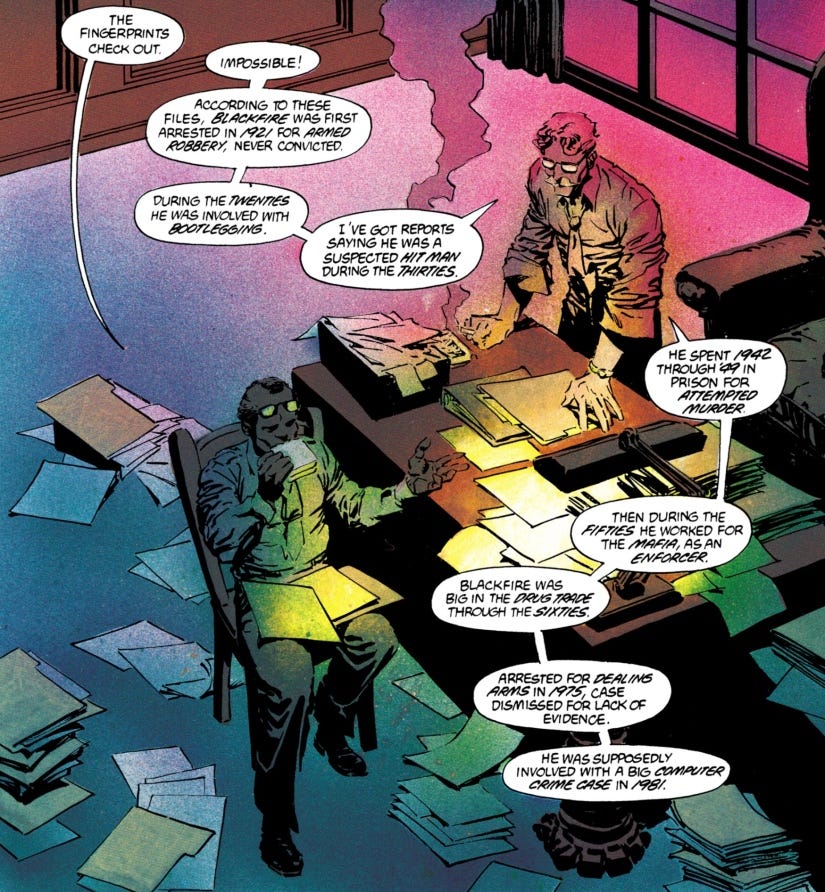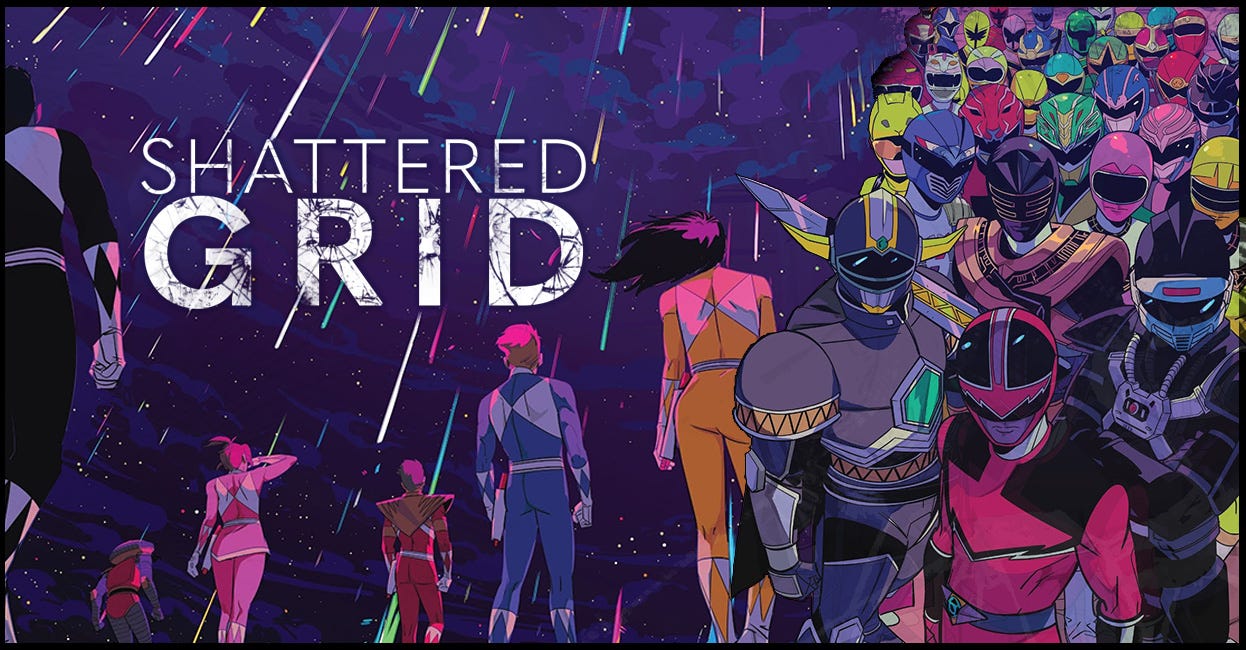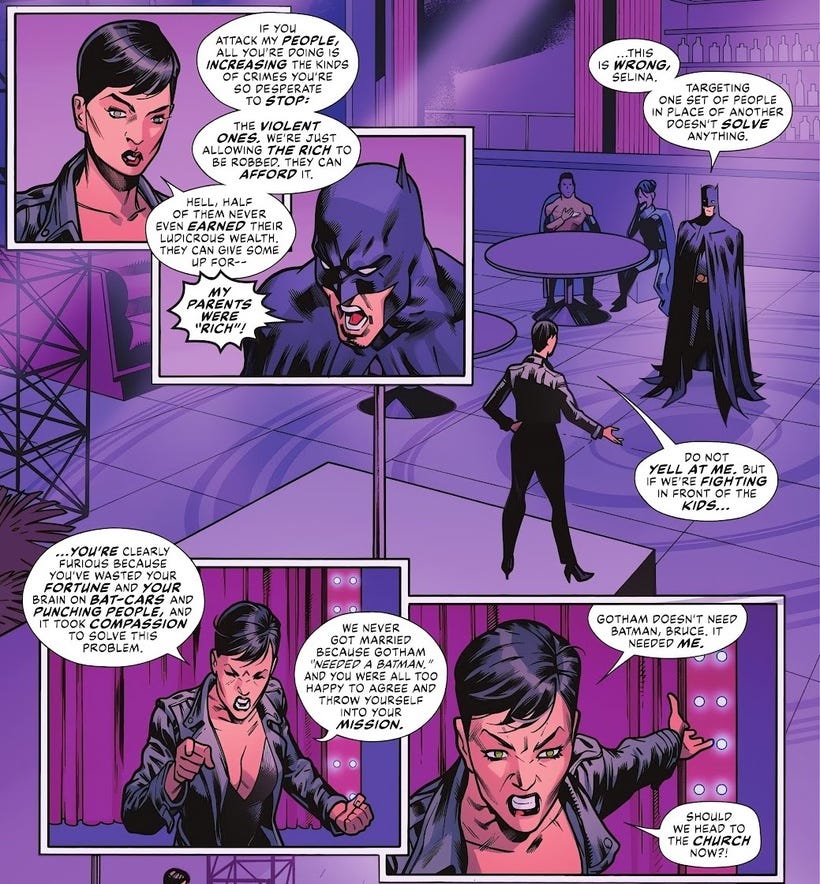Hope everyone in the US is enjoying a long weekend. This weekend for the Patreon exclusive review, I wrote about the launch of the new DC Comics event Batman/Catwoman: The Gotham War. A portion of that review will round out the Turtle Club Newsletter, after the usual roundup of what’s new in Urbane Turtle.
But we are starting the week off with the return of everyone’s favorite column:
WHY DO COMICS HATE ME?!
I cannot explain why but I spent the last week slogging through DC' Comics’ Knight Terrors event, which inexplicably put almost the entirety of the publisher’s line of books on hold. Mostly, I wanted to understand what about this story merited so much attention. No one in the comics scene that I follow was talking about it. I didn’t see any big press push from DC. It just happened, and we had to accept it.
I have no answers after reading more of it than anyone should have. A part of me felt compelled to read every single tie-in (SO MANY: see below for the completely out of control checklist) even for characters I have no interest in. But I fell asleep 3 different times reading 3 different issues for characters I generally like reading comics about. So, I wasn’t going to break my back trying to read every single issue. But I did read most of the miniseries and the main event book.
These comics offer nothing. Some have pretty good art (Tom Reilly on Superman and Juan Ferrayra on Wonder Woman stand out) but they have zero to say about the DC Universe or the characters. They just exist to pump out comics. There is no craft from a story perspective, and it’s shocking how many of them are referential to comics from 20 years ago.
Presumably, you could craft something about how superheroes stories exist for people like you and me to combat our anxieties and nightmares that could have been a compelling conflict between the DC heroes and a manifestation of nightmares. We don’t get that. We get nothing but artists drawing superheroes fighting monsters. Which looks cool but was quickly repetitive across nearly 50 issues in 2 months. What insight the writers pull out about the characters is well-trodden ground.
Instead, the story ends with the world trusting superheroes less. I don’t mind that as a status quo, but it doesn’t feel earned by what was a middling and extended story where we didn’t actually see this new Insomnia character do anything to forment that distrust. Mostly he just made big squishy monsters in various superhero dreams. DC also has a history of ignoring status quo shakeups that are meant to provide the illusion of connection across titles.
Probably the worst sin this thing commits is ending it on a cliffhanger tease for another big linewide event book that connects to Amanda Waller and Cadmus stuff that barely factored into this story. I complained recently about Marvel feeling rudderless, but DC is not faring much better right now.
The last time DC did something like this and stopped all of their books for an extended period of time was Convergence, which existed to fill a schedule gap while the company moved its headquarters across the country. There’s no similar motivation here that I can sort out. I’d love to read an investigation or conversation about what spurred this event into existence but no one seems interested in talking about it. I need someone to do a comics journalism about this!
RANDOM COMIC PANEL OF THE WEEK

GO GO POWER RANGERS
In honor of the 30th anniversary of Power Rangers, I went deep into the 25th anniversary comic event SHATTERED GRID, by Kyle Higgins, Daniele Di Nicuolo, Walter Baiamonte, and crew. This book remains an exhilarating read, and I got into t a lot of things, but it's primarily about investigating the themes of the story's focus on the power of community, and the importance of remaining true to the heart of the concept when adapting a property.
Check it out here.
NO CONTEXT COMICS
Last week’s look at 3 books I don’t read include Superboy: Man of Tomorrow from DC, Ultimate Invasion from Marvel, and Image/Skybound’s Arcade Kings. The standout was definitely ARCADE KINGS by Dylan Burnett--some great storytelling on display even though I don't know anything about the comic.
PATREON EXCLUSIVE REVIEW: BATMAN/CATWOMAN: THE GOTHAM WAR: BATTLE LINES
The full commentary is available to Patreon subscribers but see below for a snippet of this complicated review of a messy event-launching issue.
An Out of Touch Batman and a Naive Catwoman Clash in Batman/Catwoman The Gotham War: Battle Lines
There's a page in Batman/Catwoman The Gotham War: Battle Lines, an otherwise well-crafted issue of superhero comics, that threatens to tear down the entire artifice of the Batman fantasy. Catwoman outlines her ongoing plan to eliminate crime in Gotham by equipping the small-time goons and thugs who normally work for supervillains to steal from the rich. Her thinking is, by seeing to their base needs of survival, violent crime will be reduced and the only victims will be the elite who have abandoned the working class. It's a pretty idea. The rich don't care about the people of Gotham.
Batman roars back: MY PARENTS WERE RICH!!
It's a moment that paints Batman as wildly out of touch, but more importantly, it commits a cardinal sin of superhero comics: addressing questions of logic that are better left unanswered and ignored.
The scene is a clunky mix of exposition dump (for what I am sure the many people, like me, who are not reading Tini Howard's Catwoman up to this point) and laying out of motivations. Both characters present competing monologues, with the various members of the extended Batfamily hemming and hawwing. The problem is, Catwoman's argument is presented in a rhetorical argument that makes it almost impossible to criticize without looking out of touch. It's a hypothetical argument. So Batman has little to level against her other than some rumbling about how he is rich and does good, and that crime is still crime even if it's not violent. And crime is not allowed in his city--whatever the intention. It twists Batman's worldview and modus operandi, the "Why doesn't Batman simple buy crime?" meme made text.
There are obvious systemic answers for why such a thing is impossible or would not work--but they are far too complex to make an engaging issue of Batman. Instead, after Catwoman walks away I couldn't help but feeling that the ball had been dropped on this crossover before it even really started.
But as the issue goes on the obvious flaws in Catwoman's naive solution to eliminating violent crime are made evident as one of the cat burglars she has trained ends up shot dead by his intended victim. Batman sums it up. "A single father making bad choices. Everyone's making bad choices. And now this man--this father--is dead. Leaving an orphan."
It's a much more compelling contra to Catwoman's rosy view of her own moral superiority than arguing over the complexities of economic desperation and how it does or does not lead to crime.
Of course, we are also reminded throughout the issue that Batman is not at his best. Here, like throughout Chip Zdarsky's run on Batman, we are constantly reminded that Batman is feeling the weight of his years of crimefighting. The physical and mental load of battling criminals is bearing down upon him. The deadly robot Failsafe forces him to reckon with questions of his own method--has he gone too far to still consider himself a moral force for good? That is the seed that makes the philosophical debate interesting. He walks away from his argument with Catwoman and wonders if she is right. Has he been doing this so long that he has lost touch with the why and how? Catwoman scraped a life for herself on the streets on her own, while Batman had the resources to make sense of his tragedy. It's part of what makes the two such a dynamic and fascinating couple.
We are also reminded throughout this issue that not only is Batman beginning to doubt his methods and physical limitations, but he is mentally compromised... We cannot take the verbal argument fully at face value…
Read the rest on Patreon!
That’s all this week.
Later.
Tim








